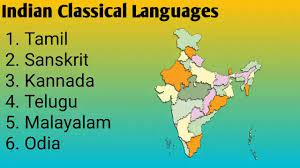India is a land of diverse languages and rich linguistic traditions. Among its vast linguistic landscape, there are several languages that hold the prestigious status of classical language. These languages have deep historical roots, ancient literary traditions, and significant cultural contributions.

Table of Contents
What is a Classical Language?
A classical language is a language that has a long history and an extensive body of literature. It is characterized by its influence on literature, arts, philosophy, and its impact on other languages. A classical language is considered a repository of cultural heritage, showcasing the evolution of civilization over centuries.
Recognition of Classical Languages in India
The process of recognizing a language as a classical language in India involves certain criteria. The criteria include a rich heritage, a documented history of at least 1,500 to 2,000 years, an independent tradition, and a body of ancient literature. The language should also have a specific influence on other languages and possess a well-developed grammar and literature.
Prominent Classical Languages in India
- Tamil: Tamil holds the distinction of being the first language to be recognized as a classical language in India. It boasts a history of over 2,000 years and has a rich collection of ancient literature. Tamil’s influence can be seen in the fields of poetry, music, dance, and sculpture.
- Sanskrit: Sanskrit, often referred to as the “language of the gods,” is one of the oldest languages in the world. It has a vast body of ancient scriptures, including the Vedas, Upanishads, and epics like the Mahabharata and Ramayana. Sanskrit’s grammar, phonetics, and literature have had a profound impact on various Indian languages.
- Kannada: Kannada, spoken predominantly in the state of Karnataka, has a rich literary history dating back to the 5th century. It has a significant influence on regional literature, art, and culture. The works of renowned Kannada poets and writers have contributed to the development of Kannada as a classical language.
- Telugu: Telugu, one of the Dravidian languages, has a rich heritage and a long history of literature dating back to the 11th century. It has made remarkable contributions to poetry, music, and dance forms. Telugu’s classic works include the famous epic poem “Sri Krishna Rayabaram.”
- Malayalam: Malayalam, the classical language of Kerala, is a linguistic gem that holds a significant place in India’s linguistic landscape. Known for its rich literary tradition, poetic beauty, and cultural heritage, Malayalam has evolved over centuries, shaping the cultural and intellectual identity of the Malayali people. In this article, we will explore the unique features and historical significance of Malayalam as a classical language.
- Odia: It is the classical language of India. With its unique script, lyrical poetry, and diverse literary tradition, Odia has played a pivotal role in shaping the identity and heritage of the people of Odisha. In this article, we will delve into the significance of Odia as a classical language, exploring its history, literary contributions, and cultural impact.
Preserving and Promoting Classical Language
The recognition of a language as a classical language is not merely symbolic but carries important implications. It helps in preserving and promoting the language’s unique cultural heritage, fostering research, and encouraging its study and dissemination. It also leads to the development of language resources, academic institutions, and cultural organizations dedicated to the language’s preservation.
Classical languages serve as a source of inspiration for contemporary literature, music, and performing arts. They provide a deep understanding of our historical roots, cultural diversity, and linguistic evolution. It is essential to encourage the study and appreciation of classical languages among younger generations to ensure their continued vitality.
Conclusion
India’s classical languages hold a special place in its cultural tapestry. They are not just languages but repositories of history, wisdom, and artistic expressions. The recognition of Tamil, Sanskrit, Kannada, Telugu, and other classical languages is a testament to their timeless significance. Preserving, promoting, and celebrating these languages is vital for preserving India’s cultural heritage and fostering a deeper appreciation of its linguistic diversity.
Important Links